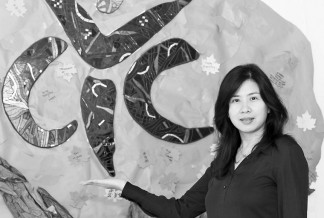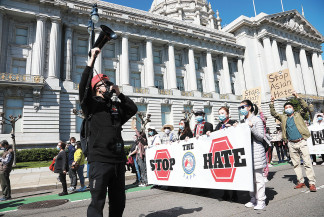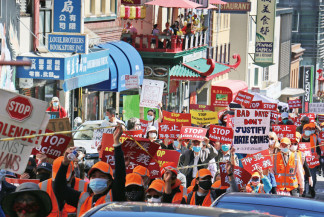
Michael Yu 三藩市
新冠病毒開始蹂躪人類已經有將近3年的時間,國際社會在各個層面都遭受了巨大的損失。疫情開始之初,中國武漢有許多人因感染病毒而死亡。當病毒進一步擴散時,全世界幾乎所有的日常活動都被迫關閉。在美國,包括學校、圖書館、操場和商業大樓在內的公共場所被市政官員下令關門。學生們不得不上網課,專業人士則在電腦前遠程工作。保安、護士和警察等基本工作人員冒著生命危險,身體力行地履行職責,以維持城市的運作。疫情開始時,作為一名高中二年級學生,我經歷了我的那份痛苦。我不能再與朋友見面,一起討論學校作業,上學不再有樂趣;我不能再像以前那樣在周末享受祖父母烹飪的美食,飯菜變得索然無味。我們只剩下焦慮,希望這場疫情能盡快結束。
在進入疫情幾個月後,武漢在其勇敢的人民的帶領下打了一場偉大的戰鬥,拯救了許多生命。此後,中國開始開放其城市並穩步恢復正常活動,同時繼續不懈地對國民進行檢測、接觸追蹤和隔離檢疫。中國作為一個發展中國家,使用了它能找到的所有工具,聯合各條戰線,不斷反擊,為世界樹立了一個好榜樣。
然而在美國,人們被堅持認為病毒很快就會自己消失的前總統特朗普誤導了。特朗普總統沒有按照衛生官員的建議正面解決問題,而是開始大肆宣揚關於病毒來源的陰謀論。他打算轉移人們對其無能的注意力,這是其政府在處理複雜國內問題時的特點。他的一個陰謀論推測,新冠病毒是在武漢的實驗室裡故意製造的,這是共產主義中國為了獲得經濟優勢而試圖傷害自由世界。時至今日,這種猜測已經傳瘋了,但仍然沒有一絲一毫的證據。他還在大批觀眾面前把這種病毒稱為「中國病毒」。這種言論為仇恨者提供了能量,分化了人們,並轉移了抗疫努力。人們開始下意識地將華裔和亞裔與病毒聯繫起來。由於人們在疫情中已經經歷了種種掙扎痛苦,一些人很自然地要尋找一個替罪羊–是其他人或事的責任。因此「中國病毒」一詞點燃了其他種族群體對亞裔的憤怒。接著,我們會聽到關於亞裔被其他族群攻擊的報告驚人地增加。我自己也遇到過這樣的口頭攻擊。有一次,我在東灣的一家沃爾瑪商店購物時,有人當著我的面大聲說:「滾回中國去!」當時一股怒火直衝腦門,我感覺自己要爆炸了,但腦袋裡一片空白。我不知道該如何反應。直到今天,我仍然後悔沒有對此做任何反應,儘管有時又慶幸沒有像我們聽到的其他一些不幸的案例那樣受到身體上的傷害。
我對這一事件進行了很多反思,認識到這些攻擊是不負責任的政客的言論,火上澆油地助長了受教育程度不高的人的沮喪情緒。我們真的必須站起來,對亞裔所經歷的仇恨犯罪進行回擊。我們必須追究政客的責任,用投票把那些試圖在選民中播撒分裂和仇恨以獲得政治優勢的人淘汰。我還想到了亞裔在美國的歷史。每當有經濟或政治危機時,中國移民就更容易成為目標。這與我們自身的文化有關,我們的文化提倡勤奮工作,在面臨逆境時少抱怨的美德。我們這一代人需要更積極主動地表達對不公正的抗議。為了從根源上遏制仇恨,我們需要團結起來,向作惡者傳達強烈的信息「我們受夠了!」我們還需要積極倡導更多的健康教育,讓受教育程度較低的人知道,無論你在哪裡,你是誰,病毒都一直潛伏在周圍。我們全世界必須始終準備好與一切困難作鬥爭。只有相互善待,尊重大自然的法則,我們才能贏。
【英文組優秀獎,本報翻譯為中文以饗讀者,英文原稿如下】
United,We Win
It has been almost 3 years since Covid-19 started to ravage humanity. The world community has suffered a great deal at all levels. At the beginning of the pandemic, many people died in Wuhan China because of the virus. When the virus further spread, almost all daily activities were forced to shut down everywhere in the world. In the United States, public places including schools, libraries, playgrounds, and business buildings were ordered by city officials to close the doors. Students had to go online to attend classes while professionals worked remotely in front of their computers. Essential workers such janitors, nurses and police officers were risking their lives performing their duty physically to keep the city functioning. As a sophomore at high school when the pandemic started, I experienced my share of suffering. I could no longer see my friends to discuss schoolwork and solve problems together. School was no longer fun. I could no longer enjoy my grandparents’ cooking on weekends as I always had. Meals had become boring. All we were left was anxiety hoping the pandemic would end soon.
After a few months into the pandemic, Wuhan led by its courageous people had fought a great battle and saved many lives. China had since started to open up its cities and resumed normal activities steadily while continuing to test, contact trace and quarantine its citizens tirelessly. China being a developing country used all the tools it could find, united all fronts and kept fighting back, setting a great example for the world to follow. However, in the United States, people were misled by former president Trump who insisted the virus would go away by itself very soon. Instead of tackling the problem head-on with the advice of health officials, President Trump started to spew out conspiracy theories about the origin of the virus. He intended to distract people’s attention from his own incompetency which had been the characteristic of his administration when dealing with complex domestic issues. One of his conspiracy theories speculated that the Covid-19 virus was created intentionally in the lab in Wuhan, and it was an attempt by the communist China to hurt the free world in order to gain economic advantage. To this day, the speculation has gone wild but still without a sliver of evidence. He further called this virus “China Virus” in front of large audience. This kind of rhetoric has given energy to haters. It has divided people and diverted efforts from fighting the pandemic. People started to subconsciously link people of Chinese or Asian descendent to the virus. With all the struggle people were already having in the pandemic, it was quite natural for some of them to look for a scapegoat – something or someone else to blame. Thus, the term “China Virus” lit up the anger other race groups felt toward Asians. Next, we would hear about the staggering climbing reports on Asians being attacked by other racial groups. I’ve experienced such an attack verbally myself. One time, when I was shopping at a Walmart store in the East Bay, someone just blurted out in front of my face, “Go back to China!”. Immediately, a furor rushed through my body from head to toes and I felt like I was going to explode but my head went blank. I did not know how to react. To this day, I still regret I didn’t do anything although I feel lucky at times that I didn’t get hurt physically unlike some other unfortunate cases we’ve heard.
I have reflected a lot on the incident and come to realize the attacks had been the result of the irresponsible politicians’ rhetoric fueling the frustration of the less educated people. We really must stand up and fight back the hate crime Asians have been experiencing. We must hold politicians accountable and vote out those who try to sow division and hate among voters to gain political advantage. I also think about our Asian history in this country. The Chinese immigrants have been a more likely target whenever there was an economic or political crisis. This has to do with our own culture which promotes the virtue of hard working and less complaint when facing adversity. Our generation needs to be more proactive and vocal in protesting against injustice. To stem hate from its root, we need to be united and send a strong message to the perpetrators, “Enough is enough!”. We also need to be active advocates for more health education to teach the less educated that viruses have been always lurking around no matter where you are, who you are. We – the world as a whole – must always be prepared to fight against all odds. We can only win if we treat each other kindly and respect what Nature has to offer.









